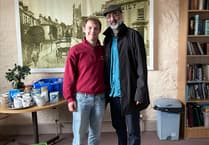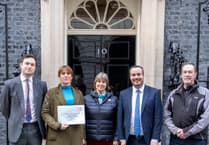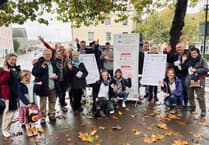A man who three years ago was given just 15 months to live after being diagnosed with inoperable brain cancer is celebrating being told there is no visible sign of a tumour.
Having had the original, crushing diagnosis in September 2014, Pablo Kelly was given the news by his oncologist last week after a series of scans.
Earlier this year Pablo, who recently moved to East Allington from Wrangaton, was told he was now able to undergo surgery aiming to remove the glioblastoma multiforme tumour. The procedure, an awake craniotomy carried out with the patient fully conscious, was carried out by expert brain surgeon Peter Whitfield at Derriford Hospital.
After the surgery Mr Whitfield told Pablo that while it had been a success, there could still be a chunk of the tumour left behind. Any mistakes in the procedure can easily prove fatal, and surgeons must err on the side of caution in terms of how much tissue to remove.
But now, he has the news he and girlfriend Rebecca Gruitt have been dreaming of.
Pablo said: "After my awake craniotomy, the surgeon said he reckoned there could be about 10 per cent of the tumour still there.
"I’ve had two clear scans since the operation, and when I went to see my oncologist she said there was now no visible sign of it, although obviously there’s a cavity still there in my brain where the tumour used to be."
The news was a revelation to Pablo, whose life and that of his nearest and dearest has been consumed for the last three years in fighting the disease. His struggle has taken a different path from most, as from the very beginning Pablo rejected conventional medicine, including chemotherapy and any form of treatment with radiation. Instead, he has followed the ketogenic diet, which is high in fat and low in carbohydrate and, the theory goes, starves cancers of the glucose they need to grow.
The diet is definitely not recommended by the NHS or most oncologists as a substitute for conventional treatment. It is more commonly used, in the NHS and elsewhere, to control seizures in epilepsy patients.
Alongside strict adherence to the diet Pablo has been taking a huge number of supplements, working with an American company called Nutritional Solutions, whose consultants examine his blood test results and manage his diet precisely.
However, he said that because glioblastoma cells are "very persistent", he plans to carry on with the diet and the supplements.
Pablo’s is a unique story because of his rejection of chemotherapy and radiotherapy, and the time he has survived post-diagnosis. He is in touch with one of the leading proponents of controlling cancer with diet, Boston College, USA professor Dr Thomas Seyfried, who described Pablo as a "long-term survivor".
Pablo will continue to have scans, with another in four months. He is also continuing to suffer seizures, which although they can be a side effect of the surgery, were the very first manifestation of the tumour that Pablo experienced.
His girlfriend recalled the visit to the oncologist where they got the good news. Rebecca said: "She said Pablo was looking really well, and he should go away, get married and have kids."
Pablo: "That was one of the first things I said to her, that I really wanted to have children.
"They’d said you should bank sperm as the chemotherapy can make you infertile and possibly impotent, and that was one of the things that made me determined to find a different kind of treatment. She remembered that."




